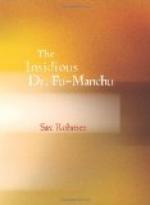Very vividly I can reconstruct in my mind that dash to the docks through the early autumn morning. My friend being invested with extraordinary powers from the highest authorities, by Inspector Weymouth’s instructions the line had been cleared all the way.
Something of the tremendous importance of Nayland Smith’s mission came home to me as we hurried on to the platform, escorted by the station-master, and the five of us—for Weymouth had two other C.I.D. men with him— took our seats in the special.
Off we went on top speed, roaring through stations, where a glimpse might be had of wondering officials upon the platforms, for a special train was a novelty on the line. All ordinary traffic arrangements were held up until we had passed through, and we reached Tilbury in time which I doubt not constituted a record.
There at the docks was the great liner, delayed in her passage to the Far East by the will of my royally empowered companion. It was novel, and infinitely exciting.
“Mr. Commissioner Nayland Smith?” said the captain interrogatively, when we were shown into his room, and looked from one to another and back to the telegraph form which he held in his hand.
“The same, Captain,” said my friend briskly. “I shall not detain you a moment. I am instructing the authorities at all ports east of Suez to apprehend one of your second-class passengers, should he leave the ship. He is in possession of plans which practically belong to the British Government!”
“Why not arrest him now?” asked the seaman bluntly.
“Because I don’t know him. All second-class passengers’ baggage will be searched as they land. I am hoping something from that, if all else fails. But I want you privately to instruct your stewards to watch any passenger of Oriental nationality, and to cooperate with the two Scotland Yard men who are joining you for the voyage. I look to you to recover these plans, Captain.”
“I will do my best,” the captain assured him.
Then, from amid the heterogeneous group on the dockside, we were watching the liner depart, and Nayland Smith’s expression was a very singular one. Inspector Weymouth stood with us, a badly puzzled man. Then occurred the extraordinary incident which to this day remains inexplicable, for, clearly heard by all three of us, a guttural voice said:
“Another victory for China, Mr. Nayland Smith!”
I turned as though I had been stung. Smith turned
also.
My eyes passed from face to face of the group about
us.
None was familiar. No one apparently had moved
away.
But the voice was the voice of doctor Fu-Manchu.
As I write of it, now, I can appreciate the difference between that happening, as it appealed to us, and as it must appeal to you who merely read of it. It is beyond my powers to convey the sense of the uncanny which the episode created. Yet, even as I think of it, I feel again, though in lesser degree, the chill which seemed to creep through my veins that day.




